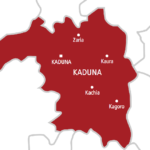
The federal government paid a large ransom to secure the release of the over 100 schoolgirls kidnapped from their school in Dapchi, Yobe State by insurgents, according to a report by the United Nations.
Daily Trust reports that all but one of the girls, Leah Sharibu, were freed after a month in captivity. Security sources have said that negotiations are still on to free Leah.
The UN report contradicts the statement of the Minister of Information, Lai Mohammed, that the girls were released with no money paid.
“It is not true that we paid ransom for the release of the Dapchi girls, neither was there a prisoner swap to secure their release,” Mohammed had said in March.
No ransom was paid, FG insists
The minister insisted in a statement last night that no ransom was paid to secure the release of the Dapchi girls.
But the UN report said the girls were freed by the Boko Haram terrorists in exchange for a large ransom payment, the News Agency of Nigeria (NAN) reported yesterday.
It said kidnapping for ransom remains one of the main sources of funding of Boko Haram activities and other terrorist groups in the Lake Chad Basin region. Apart from the Dapchi girls, many others have also been abducted in the North East by the Boko Haram and other insurgents.
The report is titled “22nd Report of the Analytical Support and Sanctions Monitoring Team, pursuant to resolution 2368 (2017) concerning Islamic State in Iraq and the Levant – ISIL – (Da’esh), Al-Qaida and associated individuals and entities.”
The report, which was submitted to the Security Council Committee, said “Meanwhile, Boko Haram (QDe.138) and the Islamic State West Africa Province (ISWAP) have had a similar impact in their areas of control, including the Lake Chad basin.
“The predominance in the region of the cash economy, without controls, is conducive to terrorist groups funded by extortion, charitable donations, smuggling, remittances and kidnapping.
“In Nigeria, 111 schoolgirls from the town of Dapchi were kidnapped on 18 February 2018 and released by ISWAP on 21 March 2018 in exchange for a large ransom payment.”
The UN said the number of doctrinally based non-governmental organisations sending funds to local terrorist groups was growing, and Member States were concerned that radicalisation was increasing the threat level in the Sahel.
The report, according to NAN, was signed by Edmund Fitton-Brown, Coordinator, Analytical Support and Sanctions Monitoring Team, who said the report was “comprehensive and independent”, and Kairat Umarov, Chair, Security Council Committee.
The UN Security Council committee on al Qaeda sanctions blacklisted and imposed sanctions on the Islamist militant group Boko Haram in 2014 after the insurgents kidnapped more than 200 Chibok schoolgirls.
The designation, which came into effect after no objections were raised by the Security Council’s 15 members, subjected Boko Haram to UN sanctions, including an arms embargo, asset freeze and travel ban.
The UN Security Council had last week said it remained concerned at the security and humanitarian situation caused by the Boko Haram terrorists and other armed groups in Nigeria, Cameroon and Chad.
In a Presidential Statement, the 15-member body regretted that Central African countries were beset by ongoing terrorist activity, instability and the effects of climate change, and asked Secretary-General Antonio Guterres to review the work of the UN Regional Office for Central Africa (UNOCA), and recommend areas for improvement.
The presidential statement read: “The Security Council strongly condemns all terrorist attacks carried out in the region, including those perpetrated by Boko Haram and the Islamic State in Iraq and the Levant (ISIL, also known as Daesh).
“These attacks have caused large-scale and devastating losses, have had a devastating humanitarian impact including through the displacement of a large number of civilians in Nigeria, Cameroon and Chad, and represent a threat to the stability and peace of West and Central Africa.
“The Council notes with particular concern the continuing use by Boko Haram of women and girls as suicide bombers, which has created an atmosphere of suspicion towards them and made them targets of harassment and stigmatisation in affected communities, and of arbitrary arrests by security forces.
“The Council emphasises the need for affected States to counter-terrorism in all its forms and manifestations, including by addressing the conditions conducive to the spread of terrorism, in accordance with obligations under international law, in particular international human rights law, international refugee law and international humanitarian law”.
Daily Trust reports that there was no immediate response from the federal government, but several government officials have insisted that no ransom was paid to secure the release of the Dapchi schoolgirls.




